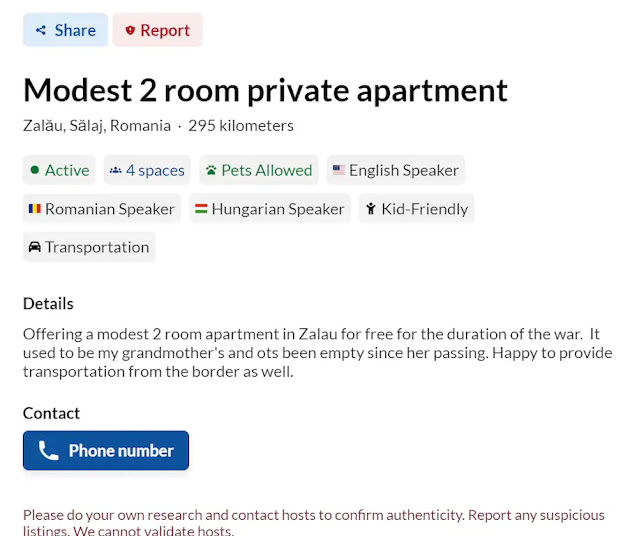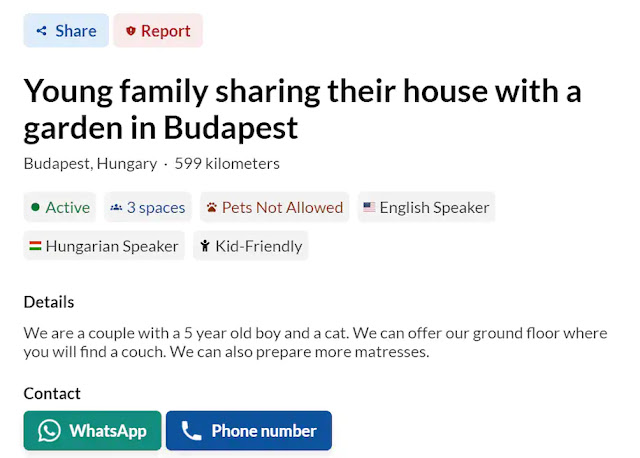Avi Schiffmann climbed into
bed after attending a demonstration in San Diego protesting Russia’s invasion of
Ukraine, but sleep didn’t come.
“I couldn’t stop thinking
about what I could do to help,” said Schiffmann, 19, a Harvard University
student who was visiting San Diego while taking a semester off. “I wanted to do
something with an instant impact.”
Two years earlier, when he
was 17, he developed a website, ncov2019.live, to help track the spread of the coronavirus around the world. The site was so well
received that Schiffmann was presented a Webby
Person of the Year award
online in 2020 by Anthony S. Fauci.
Schiffman suddenly sat up
in bed with an idea: Make a website for Ukrainian refugees who needed places to
stay in other countries. He put
out a tweet.
“A cool idea would be to
set up a website to match Ukrainian refugees to hosts in neighboring
countries,” Schiffmann posted.
He followed up asking for
help from people who spoke other languages to translate the website into
Ukrainian, Russian, Polish, Czech and Romanian.
Then he texted his Harvard
University freshman classmate Marco Burstein, an 18-year-old computer coding
whiz, to ask if he could help him quickly develop a website.
Burstein was 3,000 miles
away in Cambridge, Mass., and had papers to write and classes to attend. Anyway,
he was in.
The pair worked almost
nonstop texting and on FaceTime to create
a website that would be easy to
navigate for people offering help and those seeking it.
On March 3 — three days and
only five hours of sleep later — they launched Ukraine
Take Shelter, a site in 12
languages where Ukrainian refugees fleeing war can immediately find hosts.
“If someone has a couch
available, they can support a refugee,” said Schiffmann. “And if somebody has
an entire house, they can put it on the site and support a whole family.”
“What we’ve done is put out
a super fast version of Airbnb,” he
said.
In the first week, more
than 4,000 potential hosts around the world offered a place to stay through
Ukraine Take Shelter, and the number of hosts grows each day.
In some cases, the hosts
are even buying airline tickets to help families.
“The number of new hosts
we’re getting every day is mind-blowing, and we’re seeing immediate results in
how the website is making a difference,” he said. “It’s literally saving lives
for people in a terrifying situation.”
“We found that existing sites run by governments
to help refugees complicated,” Schiffmann said. “Somebody running away from
explosions and gunfire is under stress and needs something easy to use”.
On the Ukraine Take Shelter
website, refugees type in their current locations and dozens of host offers pop
up from the closest towns in neighboring countries. They can also specify the
number of people who need shelter and whether they have pets or family members
with special needs.
Listings offer
accommodations ranging from a sofa in a one-bedroom apartment in Lithuania to a
nine-bedroom chalet with eight bathrooms in Romania.
“I am a medical student, as
is my boyfriend and we live in a one-bedroom apartment in the center of Kaunas,
Lithuania,” wrote a volunteer host who had an available sofa. “We can only
offer our couch in the living room with free food, supplies and anything else
that is necessary. We don’t have any kids and could babysit as well.”
Some hosts don’t have room
for people, but they’re offering assistance for pets.
“We are offering a
temporary place for one dog,” wrote a host from Latvia. “We are living in an
apartment building, but with a lot of green areas and dog parks next to us.
Your dog will have food, care, a bed and long walks!”
The key to the website’s
design is its simplicity, said Schiffmann, noting that exact addresses aren’t
provided for the hosts or the refugees for security reasons.
“Our goal was to get the
site up as fast as possible to help as many people as possible, and that’s
exactly what is happening,” he said.
Both he and Burstein were
drawn to building webpages when they were young and learned how to tackle
coding by watching YouTube videos, said Schiffmann, who grew up in the Seattle
area.
Burstein, who grew up in
Los Angeles, learned to program computers when he was in third grade.
“Avi and I met after we
came to Harvard,” he said. “I made a website last summer so that Harvard
students could see what classes all their friends were taking, and Avi reached
out to me about it.”
The two ended up bonding
over their common interest of using technology to solve problems, said
Burstein.
“We’re incredibly fortunate
to be going to Harvard and to have loving families and live in a safe
environment,” he added. “We felt it was our turn to give back.”
Schiffmann, left, and Marco Burstein at Harvard University
From The Washington Post (edited)
Photos: Courtesy of Avi Schiffmann





